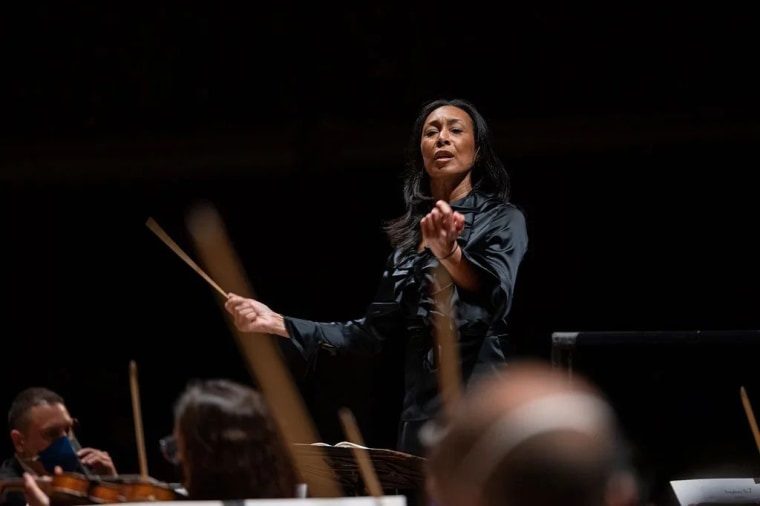Jeri Lynne Johnson was enchanted when she attended her first orchestra performance at age seven. The young pianist didn’t see her chosen instrument on stage — so, she reasoned, she would become a conductor someday.
But Johnson herself was also something not typically seen on an orchestra stage: a young Black woman.
She went on to build an impressive resume, obtaining her master’s degree in music history at the University of Chicago, serving as assistant conductor of the Chamber Orchestra of Philadelphia and becoming the first Black woman to win an international conducting award when she received the Taki Concordia Conducting Fellowship.
Yet in the orchestra world, it seemed even all of that wasn’t enough.
In 2005, the same year she won that prestigious award, Johnson was one of three finalists for a conducting job. She didn’t get it — the arts world is full of rejection, she’s quick to note — but in a rare move, the small regional orchestra reached out to offer feedback.
“When I talked to the gentleman, he was really complimentary: ‘We loved your conducting, the board thought you'd be really great to work with, you had really great ideas,’” Johnson told Know Your Value in an interview.
“But, he said, ‘We just didn't know how to market you.’ I said, ‘I don't understand what that means.’ And he finally just said, ‘Look…you just don't look like what our audience expects the maestro to look like.’”
Johnson was stunned, but in a strange way she was also grateful, she said. The man could have come up with any number of subjective reasons for choosing another candidate. But she sensed passing her over wasn’t his decision, and he wanted her to know the truth.
“Even though I was grateful for that transparency, it was really painful to know that [being a Black woman] was a barrier in my industry,” she said. “That was something I was never going to be able to overcome.”
A quiet rage took hold immediately in Johnson, and it grew over the next few months. Finally it began to cool — and with that came clarity.
“I decided, I’m going to fix this problem in classical music that we have, in which power is male-dominated and authenticity can apparently only be in European bodies for this art form,” Johnson said. “It’s like, we have this piece of grit — how do you create something beautiful out of that awfulness that makes it somehow better and more valuable for other people?”
The answer? The Black Pearl Chamber Orchestra, which Johnson founded in Philadelphia in 2008. Johnson set out to build a model for the modern American orchestra, recruiting talented and diverse musicians who trained at top music conservatories all over the country.
“We’re not just performing Beethoven; we're performing democracy as well,” Johnson said. “We're performing America's values at work, and so when you see us, you're seeing how America can and really should be functioning.”
The audience has responded, and it reflects what’s seen on stage: Where traditional classical music audiences are often heavily white, Black Pearl typically draws a majority of diverse audience members.
The orchestra has received raves from critics, along with several grants from the National Endowment for the Arts. It’s also the only American orchestra to receive three of the prestigious Knight Arts Challenge grants. The group is active in community engagement as well.
“These high art forms like orchestra are touted as meant to be something that everyone can relate to,” Johnson said. “If there’s gatekeeping, though, then how is it universal? The value of the art in our lives is beyond just the creation of something beautiful — it’s teaching people how to engage in their God-given agency, the right to self-expression. It's a fundamental skill.”
For Johnson, Black Pearl exists because of that spark of rage. She said she encourages women in all fields not to shy away from it. Instead, it’s about channeling the emotion to initiate change.
“Rage, when used properly, is like a nuclear powerhouse of energy,” she said. “It can power you to do all kinds of things — it got me through the paperwork and the payroll and all the things I didn’t really want to do — to spin up a business. Women are taught that strong emotions like anger or sadness or any 'negative emotion' should be shut down. But emotions, whether it’s joy or rage, can be a source of power if you channel them.”
Creating something entirely new can also inspire a bit of fear, which is also often considered a negative emotion, Johnson added.
“It’s something you really believe in, then the fear is just part of it and you plow ahead and you gradually become less afraid,” she said. “If you're learning and growing, then there's always a little bit of fear. I can't control circumstances, but I know me and I know if I put my mind to it, I can do whatever it is that I want to do. Now it might be hard, and it might not be fast, and it might be a little scary, but I know I can get it done.”



